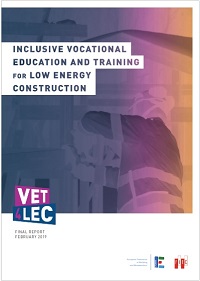Project Presentation
This project is jointly undertaken by FIEC and the EFBWW in the framework of the EU sectoral Social Dialogue for the construction industry.
In order to conform to EU low energy policies and the Roadmap to low carbon construction and retrofit, it is important to address a number of issues:
- the need for occupational coordination: energy efficiency works require close coordination between the different occupations on site, placing demands on these occupations going beyond their immediate scope of responsibilities to understand the building fabric as a unified system.
- the need for energy/thermal literacy to address the performance gap: low carbon technologies have proven to be sensitive to poor design, installation, commissioning and operation and, along with envelope construction, require enhanced technical knowledge and soft skills associated with communication, team working and self-management.
- variable construction VET programmes: Member States exhibit different VET models of governance; each system differs in its inputs and therefore impacts in different ways on the quality of site practice, access to lifelong learning, and EQF implementation.
- the (un)attractiveness of the construction sector, including for women and young people: Despite a number of initiatives to make the construction sector more attractive there are still difficulties to attract and retain women and, in several countries, young people in general. Combined with an ageing workforce there is, therefore, a clear need to address such recruitment problems in the industry, amongst others through a more open and permeable labour market and construction process.
The project intends to detail what this implies and how some of the above mentioned problems can be addressed through alliances between key stakeholders. Its aim is to identify the ways in which:
a) coordination between occupations involved in low energy construction on site can be improved so as to reduce the performance gap between design intent and implementation and meet energy efficiency targets;
b) the opportunities for low energy construction (LEC) and interdisciplinary VET can be extended so as to enhance the attractiveness of the sector and advance energy literacy, in particular for women and youth, in line with the EQF;
c) trainers can become more aware of LEC requirements and the difficulties of implementation at site level.
-
-
Final Report
- VET4LEC - Final Report (English), also available in Bulgarian, French, German, Italian, Spanish, and Polish (see below files for download)
- VET4LEC - National Report (in English) for the following countries:
Belgium, Bulgaria, Finland, Germany, Hungary, Italy, Ireland, Poland, Slovenia and Spain
- VET4LEC - Summary presenting all national reports (10 countries)
Co-Financing Source
European Commission (DG EMPL, Social Dialogue budget line)
Starting/ending date
- Start: December 2016
- End: February 2019


